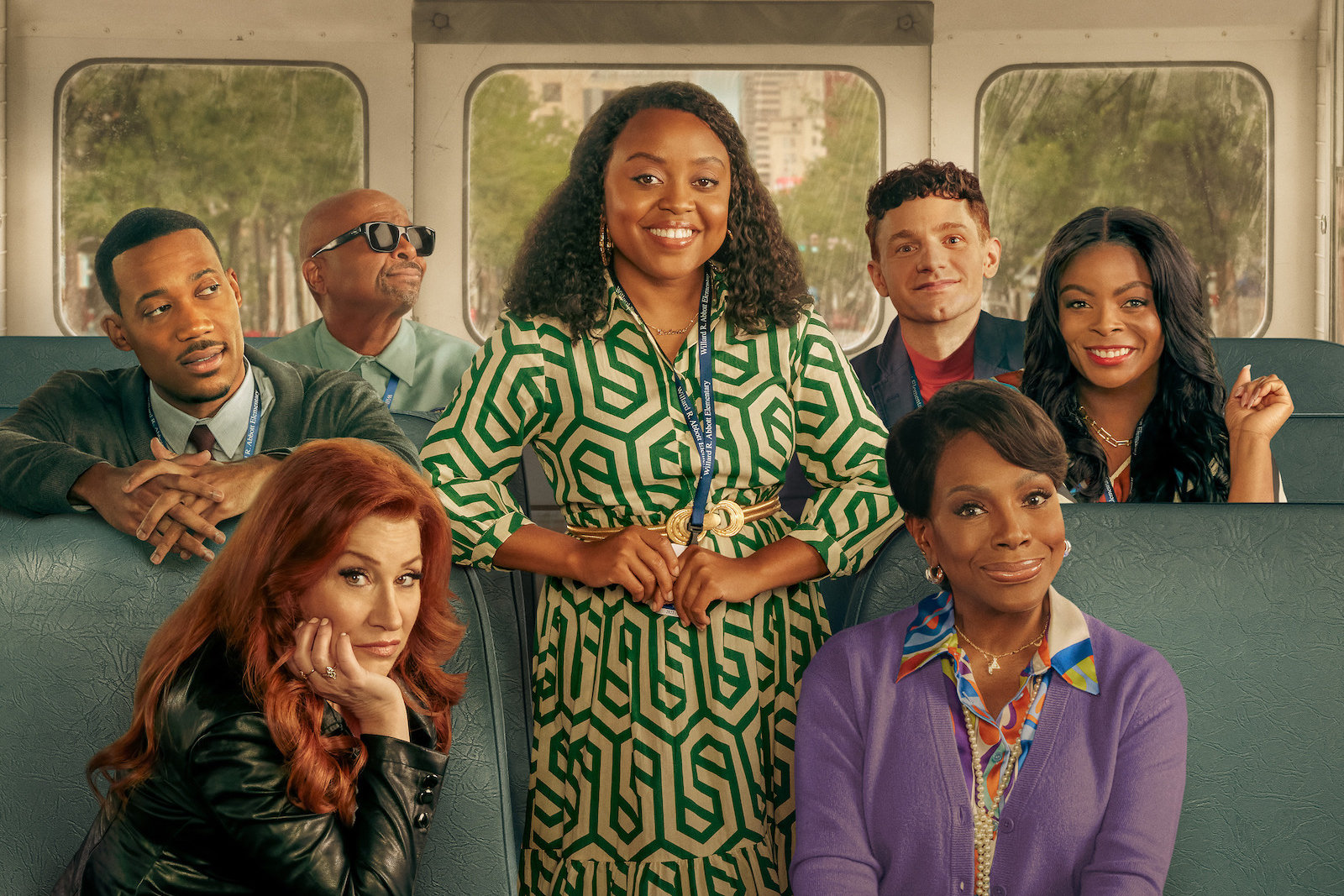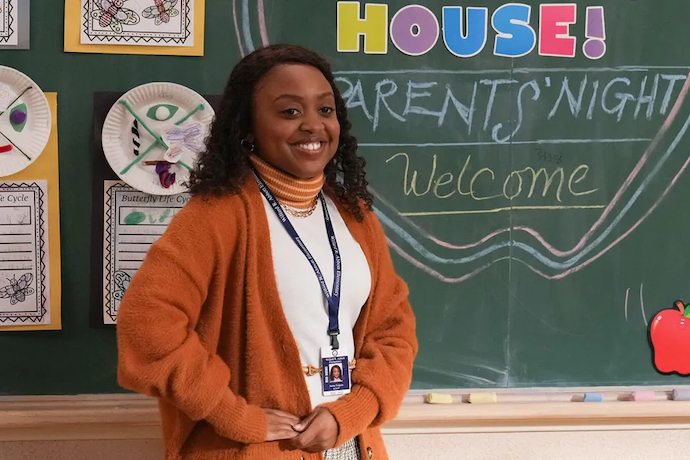
The Hilarious, Compelling, and Subversive Nature of ‘Abbott Elementary’
I thought the era of the mockumentary sitcom was over and done with. It had a good run, particularly during the height of its popularity with the one-two-three punch of NBC’s The Office and Parks & Recreation, as well as ABC’s Modern Family. But sensibilities change, and I thought prestige, high-concept sitcoms from premium cable channels and streaming platforms, such as Silicon Valley and Veep on HBO, or Unbreakable Kimmy Schmidt, The Marvelous Mrs. Maisel, Ted Lasso, and Only Murders in the Building on Netflix, Amazon Prime, Apple TV, and Hulu, respectively, were the wave of the future.
When It’s Always Sunny in Philadelphia debuted in 2005, its cynicism, dark humor, and origins on cable made it an outlier; now, fifteen seasons later, it looks like a trendsetter of sorts. The closest thing to a traditional sitcom that seemed to break out in the past few years was Schitt’s Creek, which never featured the characters sharing their innermost thoughts to the camera in a way that had been a staple just a decade before.
And then came Abbott Elementary.
For those who are unaware, Abbott Elementary, which just started airing its second season on ABC, is the brainchild of Quinta Brunson, who originated doing comedy videos for BuzzFeed years ago. Brunson herself stars as Janine Teagues, a naïve young teacher who has been teaching second grade at the titular elementary school in Philadelphia for only a couple of years. Brunson based a lot of the show on her own mother’s experience as a public school teacher. Janine lives with a deadbeat, long-time boyfriend named Tariq (Zack Fox), and her chipper attitude contrasts with that of most of her other coworkers. A new substitute teacher, Gregory Eddie (Tyler James Williams, best known before this for playing young Chris Rock for four seasons on Everybody Hates Chris) has aspirations of being a principal one day, but is now learning the ropes about filling in his new teaching position.
The school’s eccentric principal is Ava Coleman (Janelle James), who only got her job by catching the superintendent with someone who was not his wife, and seems incompetent in her position. She would much rather fancy herself an influencer, and uses the school’s money and resources for personal extravagances. Fellow teachers include Melissa Schemmenti (Lisa Ann Walter, best known to my generation as faithful nanny Chessy to Lindsay Lohan’s Hallie in the 1998 remake of The Parent Trap), a tough veteran teacher and South Philly native who seemingly has mob connections used in order to solve problems at the school, and Jacob Hill (Chris Perfetti), who teaches history and is always looking for a cause to support in his liberal activism.
The elder voice of reason is Barbara Howard, played by veteran actor of stage and screen Sheryl Lee Ralph. She has taught kindergarten for many years and has seen it all, and it is clear how much Janine in particular looks up to her. Yet, Barbara is not without her flaws, such as an episode where she struggles with new technology the school is utilizing, and thus accidentally uses it to inform them that all of her students are reading at an advanced level when this isn’t actually the case. Just this month, Ralph won the Primetime Emmy Award for Outstanding Supporting Actress in a Comedy Series for her role on the series, becoming the first Black woman to do so in almost four decades. Her win is a testament to the commitment she brings to the role, as well as line readings like “Sweet baby Jesus and the grown one, too!”
The series is easy to watch and even easier to binge, thanks to its recent addition to HBO Max. It’s also laugh-out-loud funny, I haven’t laughed at or been this invested in a sitcom since Schitt’s Creek. Yet for all the hilarious moments, Abbott Elementary also serves as a breakdown of the problems beleaguering public schools in America. Constant fights about the budget are at the forefront of much of the show’s conflicts, from Janine accidentally undoing the school’s entire electrical grid by wanting to fix a lightbulb to the teachers competing with each other to see who can go the most viral in their requests for the public to donate school supplies.

Yet, the teachers are presented as mostly noble in their crusade, from Gregory awkwardly accompanying Barbara to a nail appointment so that he may confront the mother of a student who is constantly tardy, to Janine hoping that a parent of a student who has fallen behind comes to the school’s annual open house so that they may have a conversation. Jacob and Barbara begin to plant a garden on the school’s property so that the students can have fresh vegetables with their lunches.
And there’s always the students themselves to worry about. One episode deals with a disruptive student named Courtney (Lela Hoffmeister) who gets transferred into Janine’s class and begins creating trouble with her antics. Another episode features the students jumping on desks as a part of a trend called “desking” that has gone viral on TikTok.
Ava’s incompetency and pettiness occasionally disrupt a plan that the teachers had, but even she is able to rise to the occasion once in a while. In an impassioned monologue to the superintendent Denzel Collins (Reggie Hayes) and the rest of the school board in the first season’s penultimate episode, Ava pleads “no matter what happens to me, Abbott will be fine because the teachers that work there are some of the most dedicated, hardworking, and creative teachers in this entire city…We’ve been taking appetizer money and giving these kids a charcuterie experience. Don’t give us the money because we need it, give it to us because everyone at Abbott deserves it.”
Any flaws I notice, such as the fact that teachers would never call each other by their first names in front of their students, or how much the romantic tension between Janine and Gregory mirrors the Jim & Pam subplot from early seasons of The Office a little too much, are minor compared to the overall achievement of the show. Something unique has landed in the television comedy landscape, one that features a predominantly Black cast and serves as a spotlight on the issues that affect teachers and students all across the country.
I used to think that the standard teacher character on a sitcom would be someone like Ms. Krabappel on The Simpsons: jaded, cynical, burned out, not without compassion for her students, but mostly trying to operate in her own self-interest. That’s not to say there weren’t positive depictions of teachers in sitcoms past, like Welcome Back, Kotter, or Mr. Feeny on Boy Meets World. But one of the more radical things about Abbott Elementary is that it depicts its cast of teachers as more-or-less regular people, capable of great strength and understanding, but also as flawed as any of us.
The characters aren’t big, bombastic caricatures the way that some of the characters ended up in the final seasons of The Office, nor are they overly ambitious or naïve in a way that characters on Parks & Recreation could be. They’re simply about doing a good job by showing up for their kids, day in and day out. Given how much instruction was disrupted by the pandemic, Abbott Elementary seems like the perfect show for the moment, to laugh along with and to cheer for. I’m excited to see what directions it takes, and for the upcoming storylines and moments that will define this latest entry in the great tradition of sitcoms.

